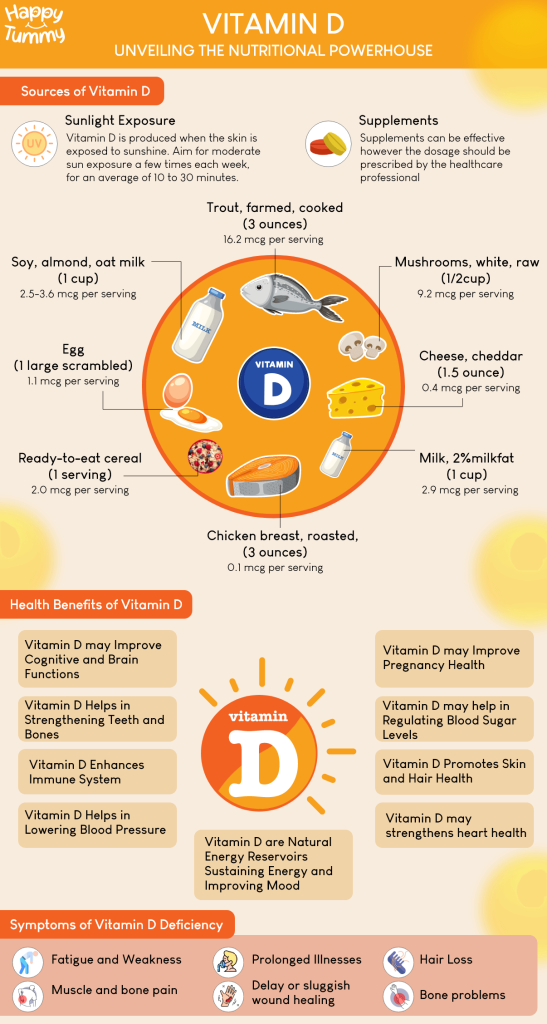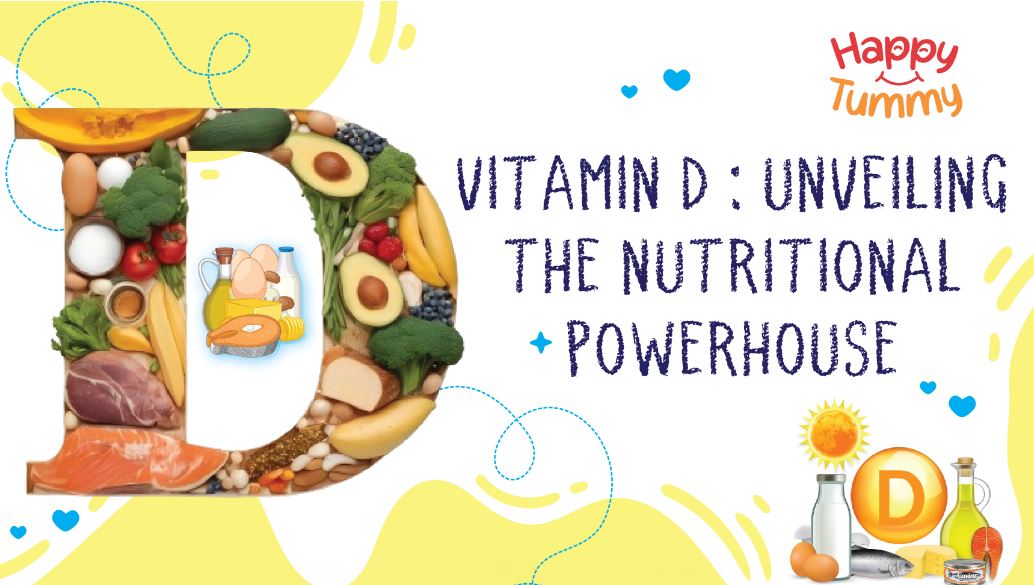Table of Contents
Belonging to a quiet village in India, my grandmother would always make us sit to bask in the gentle embrace of the sun’s warmth. She would say – “Children, learn to appreciate the sun’s healing power; it has Vitamin D.”
I learned a cherished yet nourishment lesson from my grandmother in the form of the simplest rituals of the winter season. As we sat together, stories and laughter would follow!
What is Vitamin D?
Calciferol, also known as Vitamin D, is a fat-soluble vitamin that is found in some foods by nature and supplemented in others. VitD is created naturally when the skin is exposed to ultraviolet (UV) rays from sunshine, which initiate the production of this vitamin [1].
It is often known as “sunshine vitamin” as it plays an important role in maintaining the overall health of the body.
Composition of Vitamin D
The two major forms of Vitamin D are Vitamin-D2 and Vitamin-D3 [2]. Let us know which is important for the body-
| Vitamin D2 | Vitamin D3 |
| It is a human-made vitamin that is added to foods. | It is synthesized in the skin of humans and also consumed in the diet via the intake of animal-based foods. |
| It is often found in dietary supplements or fortified foods. | It is also found in dietary supplements or fortified foods. |
| It has a lower potency. | It is more potent than VitD |
| It is less effective in raising Vitamin D levels in the bloodstream | It is more effective in raising VitD levels in the bloodstream [3]. |
Health Benefits of Vitamin D

From supporting our immune system to promoting mental well-being, Vitamin D is an essential Vit required by our body to function in daily life.
Hence, without wasting more time, let us dive and know this essential vitamin’s health benefits.
Note- Although Vitamin D may not alone be sufficient to control certain aspects of health, lifestyle changes such as diet, exercise, and stress management play a crucial role in the management.
1. Vitamin D Helps in Strengthening Teeth and Bones
VitD may highly impact our oral health and has always been associated with the lowering of oral diseases like tooth defects, caries, and other oral treatments. A study shows that maintaining appropriate 25 (OH)D levels has improved oral development and health throughout life [4].
Along with oral health, VitD promotes the absorption of Calcium in our body and promotes healthy functioning of the bones. Along with that, it is an essential micronutrient that helps protect older adults from osteoporosis while promoting balance and reducing the risks of breaking bones [5].
2. Vitamin D may help in Improving Brain Functions
A study shows that the deficiency of VitD can lead to cognitive impairment learning abilities and grooming behaviors [6].
So, it is an essential vitamin to maintain brain functions of the body as its deficiency may have been linked to problems like depression and dementia.
3. Vitamin D may help in Regulating Blood Sugar Levels
Sunshine vitamin may play a role in insulin secretion and sensitivity.
A study shows that VitD decreases insulin concentration by promoting better calcium absorption. This leads to decreasing levels of blood sugar and the prevalence of type 2 diabetes for a long time [7].
So, it seems that VitD supplementation might be a better way, along with some lifestyle changes, to control glucose control in adults.
4. Vitamin D may Strengthens Heart Health
Research shows that intake of VitD could improve heart health and lower the risk of cardiovascular disease, hypertension, and stroke. However, it is still not clear whether VitD deficiency contributes to heart disease or just works as an indicator of poor heart health [8].
5. VitD Enhances Immune System
The National Library of Medicine found that a deficiency of VitD in the human body is associated with increased levels of autoimmunity [9]. Since the immune system defends the body from foreign organisms, it is important to promote it.
Vitamin D innates antimicrobial response and synthesizes cells in the immune system, suggesting its enhanced benefits. It has shown its benefits to modulate the immune system and aid in the defense against infections [9].
6. VitD are Natural Energy Reservoirs Sustaining Energy and Improving Mood
Many times, we have seen our mothers asking us to go play outside. Have you ever wondered why?
Significant research shows that VitD may play a role in regulating mood and warding off depression. Decreased levels of Vitamin D3 can impact the level of serotonin in the brain, which, in turn, regulates mood [10].
It is a cost-effective and simple solution for many who want to uplift their mood and sustain energy throughout the day.
7. Vitamin D may Improve Cognitive Functions
VitD intake may help in improving memory, mood, and concentration. There is a chance that it may help alleviate the brain fog by improving cognitive functions.
Researchers conducted a study to determine whether a year of vitamin supplementation can improve cognitive function in the elderly. It has been found to be effective and improve cognitive function by reducing oxidative stress in the body [11].
However, stay tuned to learn about how much Vitamin D is enough for the body to avoid its toxicity.
8. VitD may Improve Pregnancy Health
Pregnant women with sufficient Vitamin D expect reduced risks of complications. World Health Organization points out that it improves maternal VitD status in the body and might also reduce the risk of pre-eclampsia and low birthweight [12].
Additionally, current evidence has shown that VitD may benefit clinical pregnancy outcomes as it effectively improves the calcium status of the fetus and infant [13].
In addition, check the digestive quotient test by Aashirvaad to keep track of your digestive health. You can figure out your digestion score by taking a simple test and know whether your tummy is a happy tummy or not.
9. Vitamin D Promotes Skin and Hair Health
Moderate sun exposure and adequate VitD levels are essential for the body to maintain healthy skin and prevent conditions like eczema. D3 may be beneficial in brightening your skin and normalizing skin cell turnover, resulting in reduced wrinkles. Additionally, it forms an epidermal barrier and hair follicles in the skin [15].
It has many roles in the skin, including working to induce genes required for differentiation and regulating hair follicle cycling. It is likely to help absorb Calcium and maintain strong bones efficiently to boost skin and hair health in the body [14].
10. VitD Helps in Lowering Blood Pressure
Vitamin D is believed to have influenced blood pressure through various pathways. It may help suppress the overaction of the system and promote healthier blood pressure levels [16].
Sources of Vitamin D
Often known as the sunshine vitamin, it can be obtained from various sources, such as.
| Sunlight Exposure | Sunlight is the most widespread and naturally occurring source. VitD is produced when the skin is exposed to sunshine. Aim for moderate sun exposure a few times each week, for an average of 10 to 30 minutes, taking into consideration variables such as geographical location, time of day, and skin type. |
| Food Sources | Fortified foods such as milk, yogurt, cheese, fatty fish, egg yolks, and mushrooms are excellent sources of VitD. |
| Supplements | It is widely available and can be an effective way to ensure daily needs. |
Also Read – Top Vitamin D rich foods to know
Vitamin D Contents of Selected Foods [17].
| Food | Micrograms (mcg) per serving | International Units (IU) per serving |
| Egg, 1 large scrambled | 1.1 | 44 |
| Cheese, cheddar, 1.5 ounce | 0.4 | 17 |
| Mushrooms, white, raw 1/2cup | 9.2 | 366 |
| Ready-to-eat cereal, 1 serving | 2.0 | 80 |
| Trout, farmed, cooked, 3 ounces | 16.2 | 645 |
| Milk, 2%milkfat, 1 cup | 2.9 | 120 |
| Chicken breast, roasted, 3ounces | 0.1 | 4 |
| Soy, almond, oat milk, 1 cup | 2.5-3.6 | 100-144 |
Recommended Dosage of Vitamin D
The recommended daily intake of VitD is [17]–
| Age | Recommended daily intake for Men | Recommended Daily Intake for Women |
| Infants | 400 IU (10mcg) | 400 IU (10mcg) |
| Children | 600 IU (15mcg) | 600 IU (15mcg) |
| Adults up to 70 years | 600 IU (15mcg) | 600 IU (15mcg) |
| Adults over 70 years | 800 IU (20mcg) | 800 IU (20mcg) |
| Pregnant or lactating women | 600 IU (15mcg) | 600 IU (15mcg) |
How much Vitamin D is too much for the body? Is Sun Enough?
The top limit for VitD intake recommended by healthcare experts for adults is 4,000 IU per day [18]. So, no! Only the sun is not enough! According to the National Institutes of Health (NIH), VitD toxicity is improbable at daily doses below 10,000 IU; however, even smaller daily intakes may have adverse consequences over an extended period of time.
Hypercalcemia, which may result in weariness, weakness, bone discomfort, and lack of appetite, may be caused by an excess of VitD. Among the most severe symptoms include [19]–
- vomiting, nausea, and dehydration
- Urination that is very thirsty
- Kidney calculi
- confusion / sapathy
Supplements are not subject to the same level of safety and purity monitoring by the Food and Drug Administration (FDA) as medications. Therefore, those who are considering taking supplements should exercise caution while selecting a brand.
Note: Contact your health care professional for assistance and appropriate dosage
Symptoms of Vitamin D Deficiency
Deficiency in vitamin D may give rise to an assortment of symptoms, which may vary in intensity from moderate to severe. The following are frequent indications and manifestations associated with inadequate levels of vitamin D:
- Fatigue and Weakness: Vitamin D insufficiency may be indicated by feelings of extreme fatigue or weakness, even after appropriate rest [20].
- Muscle and bone pain may be significantly influenced by vitamin D, which is essential for proper calcium absorption and bone health. Deficiency may result in muscular and skeletal pain, which often presents itself as widespread discomfort, soreness, or agony, concentrating on the back, hips, and legs [20].
- Prolonged Illnesses: Insufficient amounts of VitD may affect immune function, rendering an individual more susceptible to diseases such as influenza, respiratory tract infections, and common colds [20].
- VitD is implicated in the wound healing process; thus, a shortage may hinder the body’s capacity to adequately repair tissues. Delay or sluggish wound healing might potentially indicate a deficiency in vitamin D.
- Hair Loss: Although there are several potential causes for hair loss, some research studies indicate a potential correlation between insufficient VitD and hair loss, especially in those with autoimmune disorders such as alopecia areata.
- Bone problems may result from persistent and severe VitD insufficiency. In children, these illnesses may manifest as rickets, which are distinguished by skeletal abnormalities and stunted development, osteoporosis, or osteomalacia (bone softening) [20].
Take Home Message
In summary, Vitamin D serves as a fundamental component of human health, offering an extensive array of advantages that include immune function, mood management, and bone health, among others. Particularly in today’s environment, when indoor lives and restricted sun exposure are becoming more prevalent, its relevance cannot be emphasized.
Knowing the significance of VitD, its origins, and the indications of insufficiency enables people to proactively improve their health. By using optimal sun exposure, selecting vitamin D-rich foods, or supplementing judiciously when necessary, there are several ways to guarantee sufficient consumption of this essential component.
Frequently Asked Questions
The best sources of VitD are mushrooms, fish, sardines, milk, and eggs.
a) Vitamin D Helps in Strengthening Teeth and Bones
b) Vitamin D may help in Improving Brain Functions
c) Vitamin D may help in Regulating Blood Sugar Levels
d) Vitamin D may Strengthens Heart Health
e) Vitamin D Enhances Immune System
f) Vitamin D are Natural Energy Reservoirs Sustaining Energy and Improving Mood
g) Vitamin D may Improve Cognitive Functions
h) Vitamin D may Improve Pregnancy Health
i) Vitamin D Promotes Skin and Hair Health
j) Vitamin D Helps in Lowering Blood Pressure
Almonds, raisins, dried figs, and dried apricots are all excellent sources of VitD.
The 25-hydroxyvitamin D content in the blood is the most accurate indicator.
There is no quick method to raise VitD levels, although you can spend a short time in the sun with some skin exposure to raise the levels and also by including Vitamin D-rich foods in your daily balanced diet.















